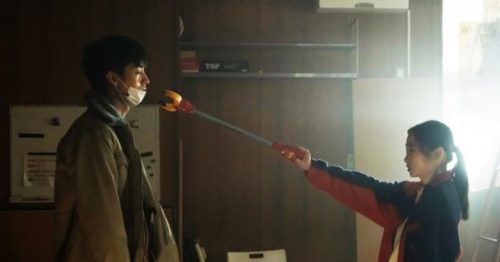No matter how much one plans, prepares, or overthinks, there are certain situations that one never knows how they’ll handle until they happen. These moments may be filled with joy and delight or saturated with despair and heartbreak. Yet, they also ultimately reveal the full scale and scope of the human condition — for better and worse. In the new film MISSING, director Shinzo Katayama explores this idea in some truly unexpected and riveting ways.
A Japanese and South Korean co-production, MISSING recently made its North American Premiere at the Fantasia International Film Festival. Written by Kazuhisa Kotera and Ro Takada, MISSING is a perfect blend of horror and thriller elements. At the story’s heart resides Santoshi (Jiro Sato) and his young daughter, Kaede (Aoi Ito). Following the recent death of his wife, Santoshi struggles with depression, drinking, and his parental responsibilities. Similarly, Kaede does her best to cope while navigating the shifting family dynamic.
Increasingly desperate to improve their financial situation, Santoshi confides in Kaede that he has caught a glimpse of a wanted serial killer on the loose. As the local authorities have been offering a hefty reward for any valuable tips, Santoshi begins to investigate and build his case. Originally brushing off her father’s scheme as foolhardy and exaggerated nonsense, Kaede’s opinion suddenly changes when Santoshi goes missing. Becoming understandably worried, Kaede sets out on her mission and unravels a more nefarious and devastating mystery than ever imagined.
Initially unfolding in a familiar thriller-type fashion, Katayama sets up MISSING exceptionally well. As actors, Sato and Ito display genuine chemistry that is as heartwarming as it is heartbreaking. Laden with grief, Santoshi and Kaede experience a parental role reversal of sorts as Kaede does her best to look out for her father. Even with the landscape and overwhelming presence of Tokyo surrounding them at every moment, a captivating intimacy is fostered through thoughtful cinematography and dialogue. By setting the emotional stage so beautifully early on, Kotera and Takada’s mesmerizing script only gets stronger with each passing minute.
Assisted by a smitten schoolmate and a concerned teacher, Kaede retraces her father’s last-known steps. Eventually leading to Santoshi’s place of employment, her fear drastically increases when she finds an imposter in his place using his name. No ordinary con artist, Kaede quickly identifies the young man as the wanted serial killer known only as No Name (Hiroya Shimizu). However, as the plot begins to thicken and their paths officially intersect, it is here that the genuinely magical mystery of MISSING kicks into gear.

Just like a snowball rolling down a hill, MISSING gains momentum and intrigue as the story progresses. Once No Name officially enters the narrative, we begin to see the story from each main character’s perspective. In the process, No Name graduates from a terrifying rumor to a monstrous leading player. Motivated by ritual, sexual gratification, and boredom, No Name’s menace stems from his indifferent and cold approach to all of it. Executed devilishly well by Shimizu, the danger of his character becomes further heightened as it merges with Santoshi and his relationship with death.
Despite minimal (but wonderful) music by Hiyoko Takai, the powerful performances, sharp editing, and stunning cinematography captivate with ease. With multiple timelines and perspective threads becoming increasingly entwined, these elements become not just appreciated but crucial. As scenes cooly clip along, it would otherwise be easy to miss essential narrative breadcrumbs.
Presented with a consistent tone throughout, the horror aspect of MISSING is amplified through its similar presentation. Shot no differently than flashbacks, street scenes, or humorous moments, the violence and all surrounding it hit with brutal realism. This universal and deliberate approach strips such scenes of sensationalism and delivers them straight to the audience without any comforting cinematic buffer. It’s a powerful strategy and one that ultimately benefits the multi-faceted story’s impact.
Filled to the brim with twists, terror, and shocking gut-punch moments, MISSING cleverly disrupts expectations at every turn. More than just a powerfully haunting and horrific exploration of grief, it’s a film about the lengths we’ll go for those we care about when pushed beyond belief. It’s a film about pain, suffering, coping, dismay, and the internal struggle that can arise when they combine. So put away your phone for this one. MISSING demands your attention and does not disappoint.
Tags: Aoi Ito, Fantasia Film Festival, Film Festivals, Hiroya Shimizu, Hiyoko Takai, Japanese Horror, Jiro Sato, Kazuhisa Kotera, Korean Horror, Missing, Ro Takada, Shinzo Katayama



No Comments